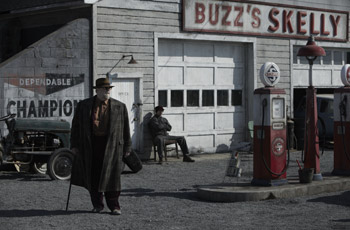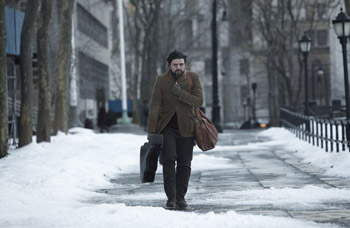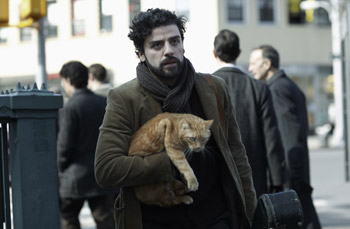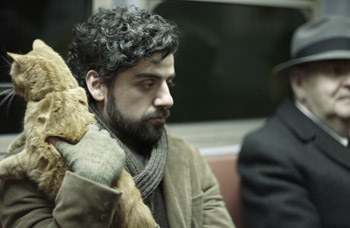T Bone Burnett Inside Llewyn Davis Interview

T Bone Burnett Inside Llewyn Davis Interview
Cast: Oscar Isaac, Carey Mulligan, Justin Timberlake, John Goodman, and Garrett Hedlund
Directors: Ethan Coen and Joel Coen
Genre: Music, Drama
Rated: MA
Running Time: 105 minutes
Synopsis: Inside Llewyn Davis, the new film from Academy Award-winners Joel and Ethan Coen, follows a week in the life of a young folk singer at a crossroads, struggling to make it in the Greenwich Village folk scene of 1961. Llewyn Davis (Oscar Isaac)"guitar in tow, huddled against the unforgiving New York winter"is beset by seemingly insurmountable obstacles, some of them of his own making. Living at the mercy of both friends and strangers, scaring up what work he can find, Llewyn journeys from the basket houses of the Village to an empty Chicago club"on a misbegotten odyssey to audition for a music mogul"and back again.
Inside Llewyn Davis
Release Date: January 16th, 2014
Interview with T Bone Burnett
T Bone Burnett, the renowned musician who played on Bob Dylan's Rolling Thunder tour, is a songwriter and soundtrack and record producer, working with artists as varied as Roy Orbison, John Mellencamp, Elvis Costello and Diana Krall, Elton John, Tony Bennett, and many others. Burnett won Grammy Awards for the soundtrack of the Coen Brothers' film O Brother, Where Art Thou? and for his work with Alison Krauss and Robert Plant. His song -The Scarlet Tide' from Cold Mountain earned an Academy Award nomination. In 2010, Burnett won the Oscar for his song -The Weary Kind' for the film Crazy Heart. He is currently producing the music for the ABC-TV Show 'Nashville."
 T Bone Burnett: You know, it's a really important film to me, so…
T Bone Burnett: You know, it's a really important film to me, so…
Question: Why do you feel that? Why is it important for you?
T Bone Burnett: The film is about a time very much like the time we're in.
Question: Can you explain that?
T Bone Burnett: Well, I don't want to give a lot away. But you know, the film is about a time when there's a new moment happening. The old has died, and the new thing hasn't quite been born We've been in an interregnum now for the past ten years, really, where the old has been dying but is not dead, and the new is being born but it's not yet alive.
We've been in this brackish water where it's not one thing or another. The old structure that we lived in for, you know, my whole lifetime has been dismantled for the most part. But the new, the new structure hasn't taken place. You realise this is an incredibly long conversation that has to do with, you know, eve thing that's going on in the Internet, and in music.
Question: I understand.
T Bone Burnett: But at any rate, I feel we're at a time now when the value of music has been brought into question. And this movie speaks very eloquently, I think about the value of music, and about the value of art throughout culture. We've been in a period of time for the last twenty years really, during which there's been an assault on the arts by the technology community. The technology community has devalued the art, especially music, and has taken over the role of the artist in the society. We're being told now that artists are to crowd source their work, that artists are to follow the crowd rather than lead the crowd. Well, there's no artist worth his salt that will follow the crowd.
Question: Of course.
TB: I'm not interested in any artist who will follow the crowd. Jules Verne put a man on the moon a hundred years before a rocket scientist did. Einstein said that Picasso preceded him by twenty years. The arts have always led the sciences, and they should, too, because the arts are involved with the whole of humanity, the whole of the creation, not just specific parts of it. We can't let the engineers be in control of our society because one thing will happen. We will turn into the matrix. So that's why this film is important to me because it talks about this in a very eloquent way. So many arguments have been posed, so many cheap arguments have been floated out there, and they're still floating around our culture like, like a virus, exactly like a virus. As in -Information wants to be free.' This film is a much more profound way to talk about where we are.
Question: How do you see that issue in the movie in terms of the character Llewyn Davis and his story?
T Bone Burnett: Well, you know, the thing is he's very good, but the thing he's doing"there's no line there's no structure that supports what he's doing at all. He's completely out on his own. And that's where all musicians are today. Every musician in the world, you know. The irony of the Internet, which was supposed to democratise everything, is that it's consolidated power even more so in the big media companies.
Question: It's true.
T Bone Burnett: And the individual artist that it was supposed to empower is essentially just putting a message in a bottle. There's no support system for anybody; so an artist"Llewyn in the film"can go to the record company and look for his royalties, but you know, there are no royalties because"they made one box of records and it's in the closet. That's the access the internet gives us.
Question: That is exactly what happens to Llewyn. He's a serious musician and artist, and he has integrity but he can't make it work for him.
T Bone Burnett: Because there's just nowhere for him to ply his trade. He can go again to the Gaslight for the"however many times...
Question: Yes.
T Bone Burnett: …but you know, it's just going to get him the same results. He'll get some applause, he'll get drunk, and then the next morning he'll wake up on somebody's couch. As he does. The thing"and I'll say this. This is something I'll say about the film. This sounds like something a press agent would say, but I'll say it. I want to say this very soberly. I cannot think of a precedent in the history of civilisation for this performance Oscar Isaac gives in this film.
 Question: Yes he's amazing.
Question: Yes he's amazing. T Bone Burnett: : I don't think any actor has ever learned to play and sing a repertoire this thoroughly and compellingly, and be able to film it all live without a click track, without the aid of tuning, without the aid of technology"just a complete analog performance of this character whose music Oscar had never heard a year before he did the film. Unbelievable. Oscar absorbed the guitar playing of Dave Van Ronk and the era"a technique known as Travis Picking"as if he was born to it. He learned all the songs, and he learned to sing -em so naturally. The thing is when we were on the set"in the movie you always have some kind of thumb track or click track or something that sets the tempo so you can cut between takes. But in this case, you know, the Coens decided early on that they just wanted to shoot and record the music live. No playback.
Question: I was going to ask you about the decision to film the music live.
T Bone Burnett: They wanted it that way, and because they wanted the movie to have something of a documentary feel, something of that period about it. I think they wanted the reality of it, just the raw reality of it happening right there because you can never get quite that thing in lip-synching. At any rate, I was talking about Oscar's performance.
Question: I understand that the Coens sent you Oscar's audition tape and you told them you felt he was as good as any professional musician in this music.
T Bone Burnett: Yeah, I said he's as good as the musicians I work with"he's playing and singing as well as anybody I know. That style. And that's not an easy style to play. Travis Picking it's called, as I mentioned, it's a finger picking style that was, as far as I know, pioneered by a Black musician from Kentucky named Arnold Schultz who taught it to Ike Everly who taught it to Merle Travis, and then it became known as Travis Picking in Nashville because he popularised it.
Question: Can I ask you about the music you chose for the film? Joel and Ethan, describing your working method together, said that they tell you what they're thinking and then you make suggestions. So can you talk a little about what you suggested and why for the film?
T Bone Burnett: You know what? I can't remember"by the time we're finished, I'm serious, I look at it as such a collaboration that I don't distinguish between what anybody suggested other than I will say, honestly, I think they suggest almost everything. And I just facilitate. But, every once in a while I'll come up with something like maybe a good idea for another film or something. (laughs) Like on The Big Lebowski I suggested -Man of Constant Sorrow' as a, you know, a theme song for our epic hero, The Dude.
Question: Yeah.
T Bone Burnett: And they thought it was a great song for our epic hero Ulysses Everett McGill. In O Brother, Where Art Thou?
Question: O Brother was their next film. They didn't use it in The Big Lebowski.
T Bone Burnett: That's right…
Question: They said you suggested -500 Miles', the Tom Paxton song, for Llewyn Davis.
T Bone Burnett: I think I probably did. I love it"that's a beautiful, beautiful song. Dylan did a version of it. But the movie starts out with -Hang Me.' Song about getting hung. And then it goes into -If I Had Wings,' and then you come into Llewyn's world and you find the guy he had done -If I Had Wings' with jumped off a bridge. And then every song is either about death, abortion, murder, you know. It's separation. -500 miles' I love because I think it's a slave song.
Question: It is?
T Bone Burnett: 'I can't go home," you know, 'I can't go home this way." It feels like a deep, beautiful song from the slavery era in this country, and I thought it was interesting the way it's been metabolised into the culture through folk music, the way I guess the liberal world was able to take that song and make it part of the culture in a way that people could hear it, you know, and not be too guilty. I don't know, I'm getting into some crazy territory…
Question: It's very interesting. I love that song, but I never thought of it that way.
T Bone Burnett: 'If you miss the train I'm on, you'll know that I'm gone. Hundred miles… not a shirt on my back, not a penny to my name, I can't go home this way." Doesn't that feel like that dislocation?
Question: Yes.
TB: That just feels like a deep story in our culture. An interesting aspect of the folk world is its connection to the Rights Movements, the Civil Rights Movement.
The progressive element of folk is emerging again at that time with people like Baez, and then Dylan appears. The Coens deliberately set the story specifically in the pre Dylan era. They wanted to explore the music scene as they say that existed before Dylan came and changed everything.
Question: In talking about the music in Inside Llewyn Davis they said they see a deep connection to the music in O Brother, they say both films contain the same species of music. You feel that way as well?
T Bone Burnett: Yeah, I do. It's American, American music. Traditional"I call it traditional American music. I don't know what else to call it really because it's, it's the music of the poor people. And it's beautiful. Like all of the great cuisines, all the great food innovations not all of them but so many of them"were peasant foods; barbecue for instance down here in the South. They invented barbecue sauce because they would get the meat that would go bad, and they'd have to cook it for two weeks to get it, to get it, you know…
 Question: Edible.
Question: Edible. T Bone Burnett: It would taste so bad they would put barbecue sauce, they'd put all kinds of crazy sauce on it. So that's this connection… to the kind of music this is. It's the kind of music that grows out of that same situation.
Question: Can we talk a little more about the music in the film. That song, -Please, Mr. Kennedy.' Where did that come from?
T Bone Burnett: Well there was, there was a folk song during the Vietnam era called, -Please, Mr. Kennedy, don't send me off to Vietnam." And my guess is it was a riff on a Tom Lehrer song. Tom Lehrer, the great satirist. I love Tom Lehrer. I think the folk movement took a cue from him and tried to produce that sort of satire. And that song, 'Please, Mr. Kennedy""it was supposed to be a fake rock 'n' roll song that was supposed to deal with the issue of Vietnam. But we moved it to our period and made it a spoof of the Space Race.
Question: So it's a real song you just rewrote lyrics to?
T Bone Burnett: Yes. We used the old song as a basis for this song, and then wrote new melodies and new lyrics. Justin [Timberlake] wrote a couple of new melodies, beautiful melodies, and I think all of us wrote lyrics. Justin, Ethan, Joel, and I all wrote.
Question: Justin Timberlake really threw himself wholeheartedly into his role. It seemed like you were all having a great time shooting that scene in which they were recording that song.
T Bone Burnett: I was just sitting on the side"you know, just off-camera with this stop watch, old school, timing measures to see if Oscar was speeding up or slowing down. If we had a take or not that we could use. And Oscar never"he must have worked with a metronome or I don't know what. He's just got it in his soul. But he never varied once, not one song, on all those takes. He never, never varied. We were able to cut between every take. I'm excited about -cause there's just no better way to spend your time than doing this kind of thing that they do with this kind of music.
Question: You got Marcus Mumford of Mumford & Sons involved in the film, yes?
T Bone Burnett: I did. -Cause his music's quite interesting. He's the energy of his band, and the energy of that band is unbelievable.
Question: I've never seen them live but I've got their albums on you know, as you say, on the Internet.
T Bone Burnett: Marcus is really a brilliant and insightful lyricist, and I thought he was a good man. He just seemed like one of the boys. He seemed like he was on the team.
Question: Let me ask you about Dave Van Ronk. Can you talk a little bit about him? I mean obviously you knew of him and the Coens knew of him.
T Bone Burnett: Actually I didn't know him.
Question: Really?
TB: Yeah. The only thing I can tell you about Dave Van Ronk is he wasn't a loser. He was a brilliant artist who suffered this fate that many of us suffer. No matter what, you can suffer this fate… like in The Unforgiven where the young kid has just shot a man and he's feeling incredibly guilty, and he's getting drunk, and he says, 'Well he had it coming," and Clint Eastwood says, 'We all got it coming, kid." It's a great line. But yeah, Dave never got his due, that's for sure. But you know, he was tremendously influential. You know Dylan slept on his couch. Like Llewyn, sleeping on couches. And like Llewyn, he never got his due. But he had it coming.
Inside Llewyn Davis
Release Date: January 16th, 2014
MORE
- Mission: Impossible Fallout
- Glenn Close The Wife
- Allison Chhorn Stanley's Mouth Interview
- Benicio Del Toro Sicario: Day of the Soldado
- Dame Judi Dench Tea With The Dames
- Sandra Bullock Ocean's 8
- Chris Pratt Jurassic World: Fallen Kingdom
- Claudia Sangiorgi Dalimore and Michelle Grace...
- Rachel McAdams Disobedience Interview
- Sebastián Lelio and Alessandro Nivola...
- Perri Cummings Trench Interview



